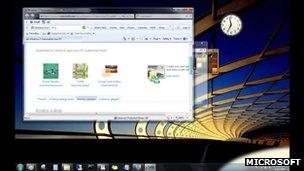Motorola wins Xbox and Windows 7 ban in Germany
- Published

Microsoft could be forced to recall and destroy its products if Motorola enforces the injunction
Motorola Mobility has been granted an injunction against the distribution of key Microsoft products in Germany.
The sales ban covers the Xbox 360 games console, Windows 7 system software, Internet Explorer and Windows Media Player.
It follows a ruling that Microsoft had infringed two patents necessary to offer H.264 video coding and playback.
A US court has banned Motorola from enforcing the action until it considers the matter next week.
The handset maker is in the process of being taken over by Google.
Appeal
This is just one of several cases involving about 50 intellectual properties that the smartphone maker has claimed that Microsoft should have licensed.
Microsoft has said that if it met all of Motorola's demands it would face an annual bill of $4bn (£2.5bn). Motorola disputes the figure.
A statement from Motorola said: "We are pleased that the Mannheim Court found that Microsoft products infringe Motorola Mobility's intellectual property. As a path forward, we remain open to resolving this matter. Fair compensation is all that we have been seeking for our intellectual property."
Microsoft said it planned to appeal against the German ruling.
"This is one step in a long process, and we are confident that Motorola will eventually be held to its promise to make its standard essential patents available on fair and reasonable terms for the benefit of consumers who enjoy video on the web," a spokesman said.
"Motorola is prohibited from acting on today's decision, and our business in Germany will continue as usual while we appeal this decision and pursue the fundamental issue of Motorola's broken promise."
US hearing
Microsoft moved its European software distribution centre from Germany to the Netherlands last month ahead of the verdict to minimise potential disruption.
However, Motorola cannot enforce the ruling until a Seattle-based judge lifts a restraining order.
The restriction was put in place after Microsoft claimed that Motorola was abusing its Frand-commitments - a promise to licence innovations deemed critical to widely-used technologies under "fair, reasonable and non-discriminatory" terms.
A hearing is scheduled for 7 May, although the judge may issue his ruling at a later date.
The German case is also likely to be considered by the European Commission.
It is carrying out two probes into whether Motorola's Frand-type patent activities amount to "an abuse of a dominant market position".
- Published24 April 2012
- Published9 April 2012
- Published3 April 2012